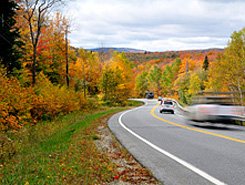Vermont Clean Cities
The Vermont Clean Cities works with vehicle fleets, fuel providers, community leaders, and other stakeholders to identify community-driven choices that save energy and promote the use of alternative fuels and advanced vehicle technologies in transportation.

25 Colchester Ave, Mansfield House
Burlington, VT 05405
Peggy
O'Neill-Vivanco
802-656-9123
Peggy.ONeill-Vivanco@uvm.edu
General Stats
- Designated: June 25, 2001
- Population: 643,816 (based on 2022 Census estimate)
- Area: 9,615 sq. mi.
- Local/Regional Service Area: Entire state of Vermont
Alternative Fueling Stations
Including public and private stations

- Biodiesel (B20 and above): 2
- Electric (charging outlets): 1,346
- Ethanol (E85): 0
- Hydrogen: 0
- Natural Gas: 2
- Propane: 3
Energy Use Impact*
Annual Energy ImpactEmissions Reduced*
Annual Emissions Reduced
Peggy O'Neill-Vivanco
Peggy O'Neill-Vivanco conducts program outreach and coordination at the Transportation Research Center at the University of Vermont. She is the director of the Vermont Clean Cities Coalition, funded by the U.S. Department of Energy, where she brings together stakeholders in the public and private sectors across the state to provide assistance to fleets implementing alternative fuels, advanced fuel vehicles, and transportation efficiencies. Her work with stakeholders covers a wide range of topics including, idle reduction technologies, electric lawn equipment, electric bicycles, and transit options for rural and underserved areas.
Peggy holds an MA from New York University. She is a year-round bike commuter and advocate for safe bicycle and pedestrian infrastructure for all users.
Learn about just some of the projects from Vermont Clean Cities. Visit the Vermont Clean Cities website for more projects and information.
Projects and Case Studies Green Commercial Lawn Mowers
Green Commercial Lawn Mowers
 Lamoille Valley Ford Is #1 for Electric Vehicle Sales in Vermont
Lamoille Valley Ford Is #1 for Electric Vehicle Sales in Vermont